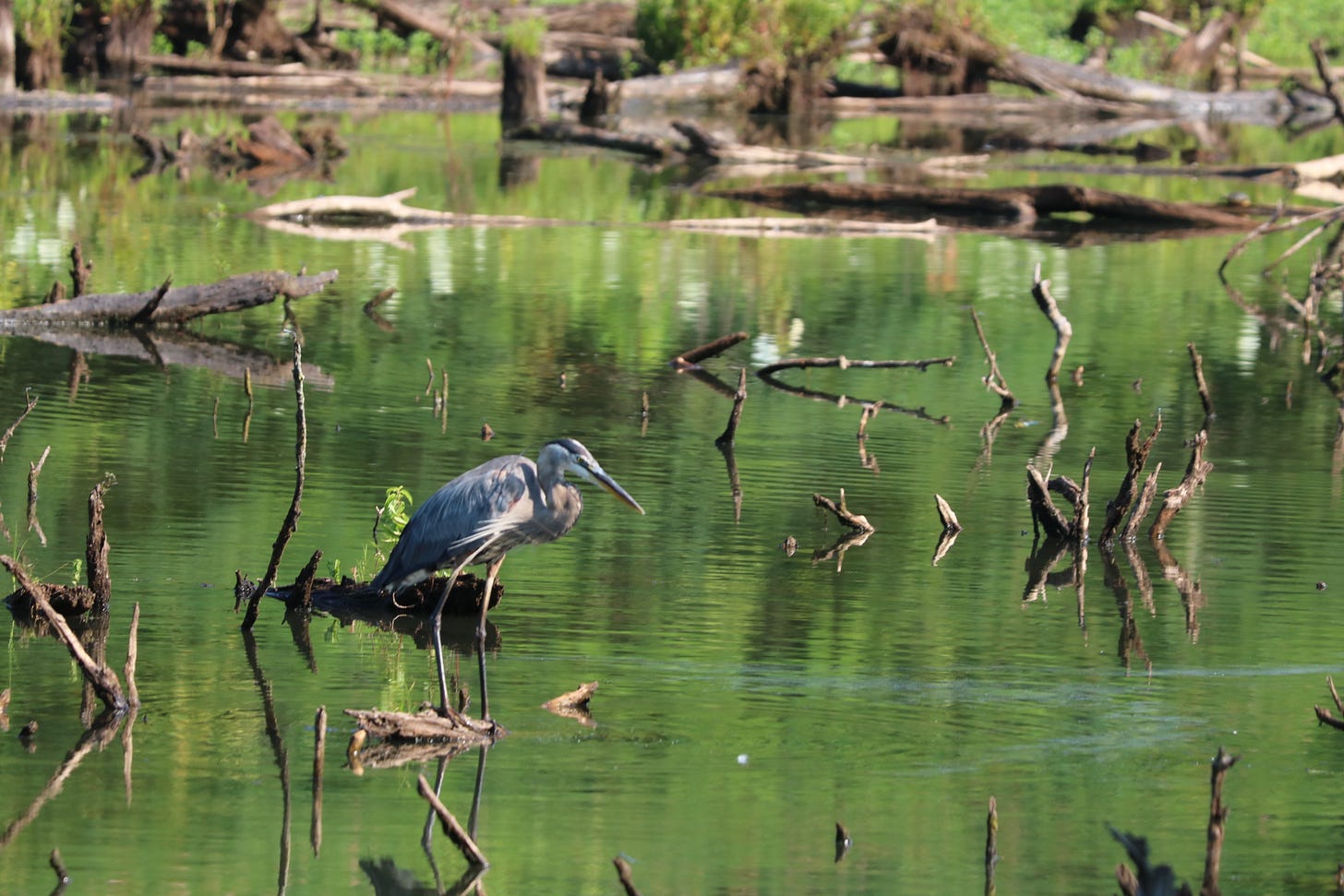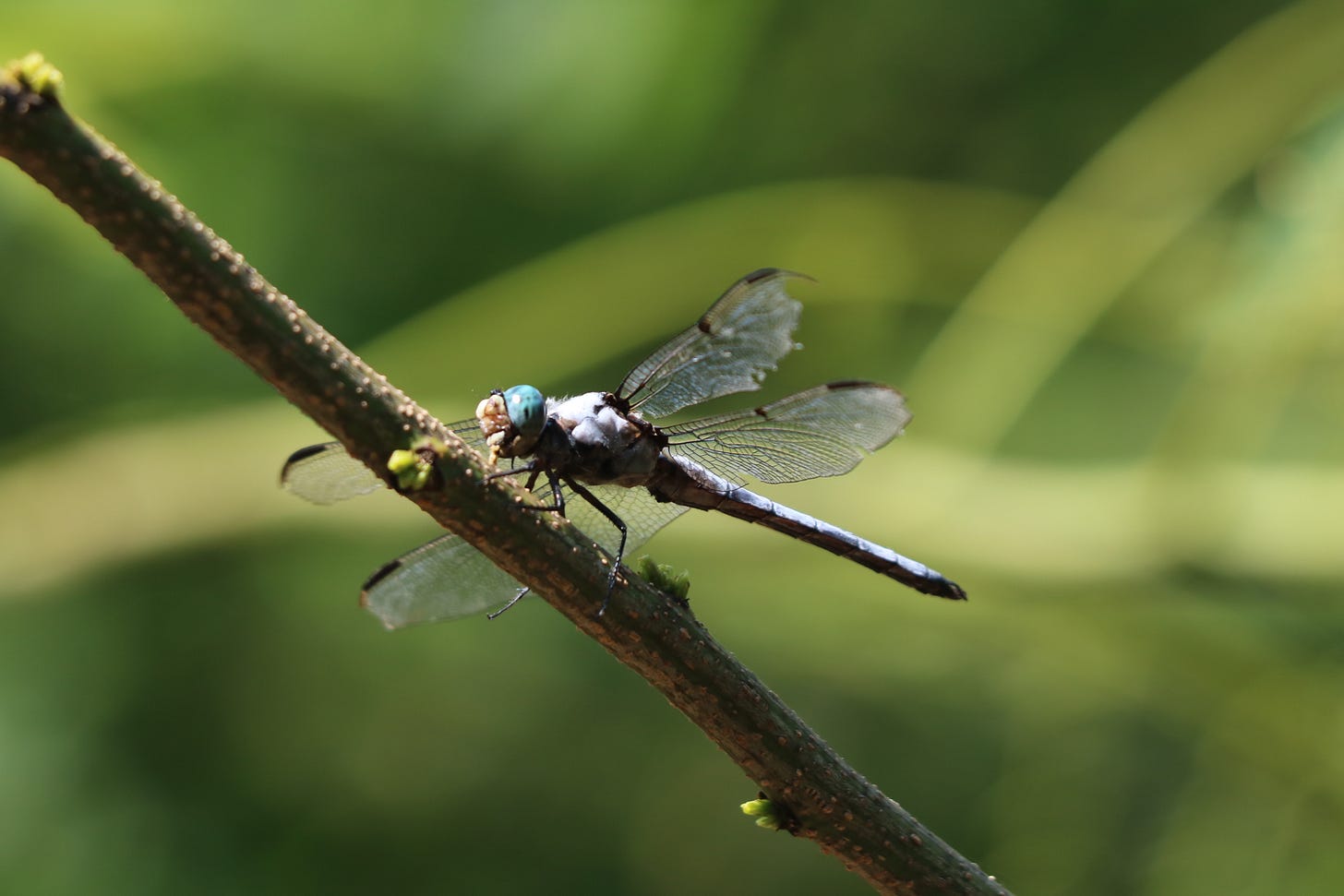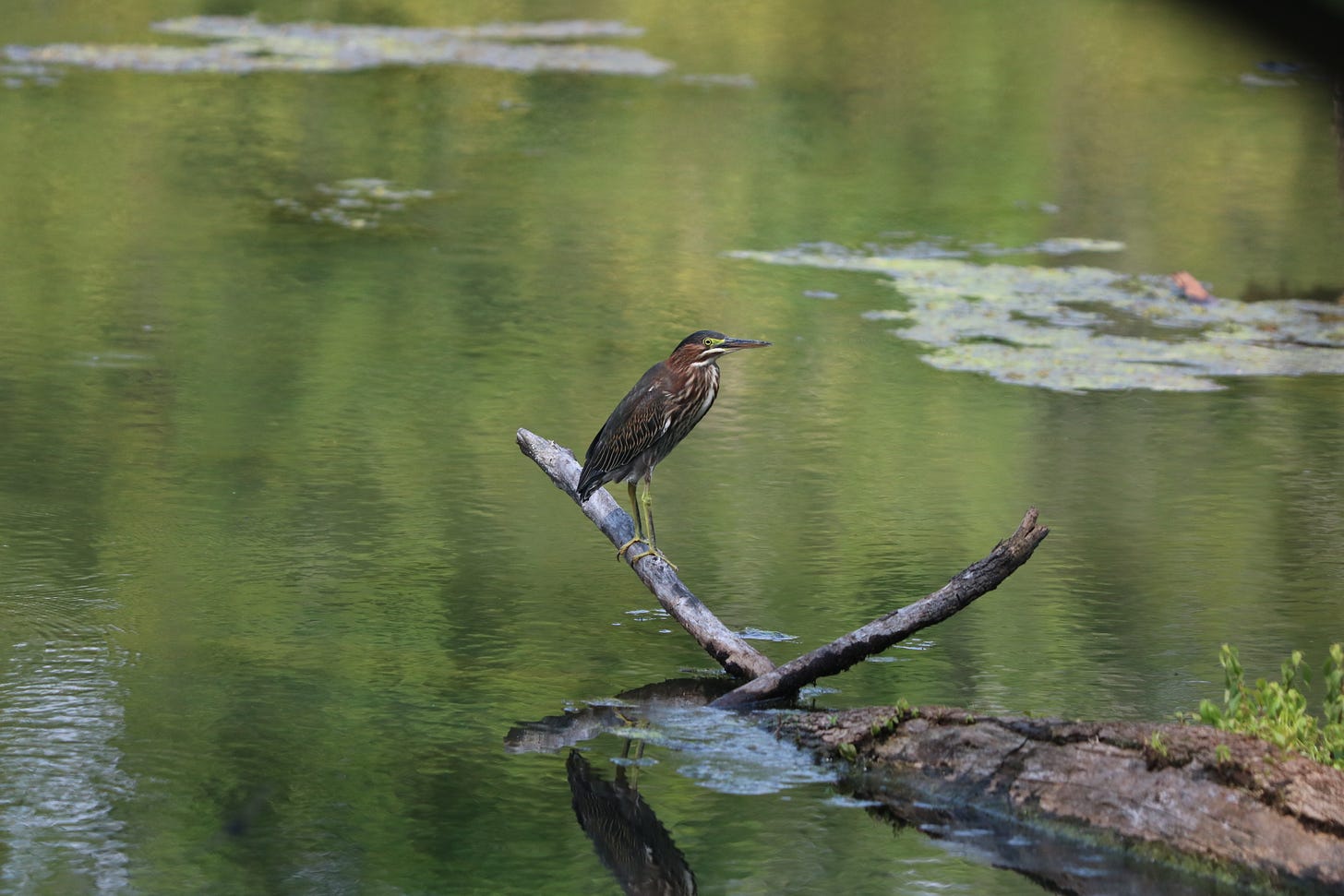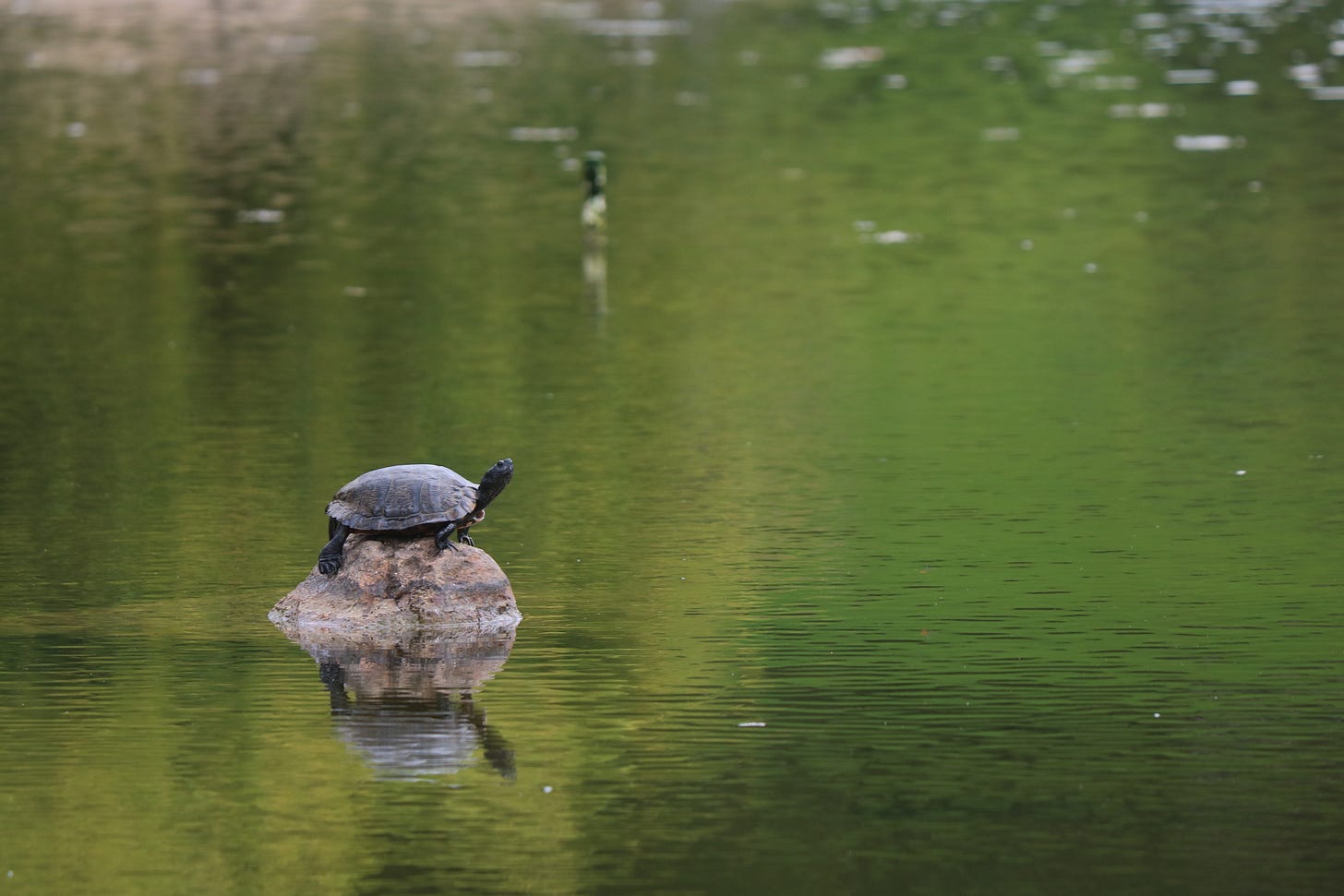Great Blue Heron - Ray Zimmerman created the photos in this issue of Cranes Eye View at the Marsh on Curtain Pole Road, Chattanooga, Tennessee.
I am the Lorax, I speak for the trees.
I speak for the trees for the Trees have no tongues.
- The Lorax, Dr. SuessI recently received a suggestion that I read Robin Wall Kimmerer’s essay, Greed Does Not Have to Define Our Relationship to Land. I had never read this essay before, but it is excellent. It echoes “Defeating Wendigo,” the final chapter of her book Braiding Sweetgrass, but is much more specific in that it addresses the desecration of Bear’sEars National Monument. Though that action has been undone, it could be repeated by a future leader.
I wrote the following poem, inspired by the book and other stories of Wendigo. It appeared in my book, Healing And Conflict.
The Wendigo’s Way The Wendigo is born In The Hunger Moon a cautionary tale of hard times and short supplies. Born of the time when frost paints the ground, he sees only shortage - seeks to seize what he wants from others. More than that, he is a cannibal. He glowers across a clearing and gives chase as you dash away. Forget your dignity. Run! Only the bravest soul hunts Wendigo. No chain can hold him, his hair a static electric shock. No fawn will gambol in his woods. Wendigo ate his own lips in lust for human flesh, but he was once a man. Think on that when you wish for just a little more.
Dragonfly
A story that illustrates this concept in a more general way comes through in the poem, “Rabbit Is Up to Tricks,” by Joy Harjo, the first Native American to serve as Poet Laureate of the United States. The poem appears in her book, Conflict Resolution for Holly Beings, and on YouTube.
Terry Tempest Williams addressed the desecration of Bear’s Ears in her book Erosion. From that starting point, she addressed the erosion of environmental protection in the wider society. I read some sections of this book several times.
Since Kimmere’s essay also mentions water as life, I am pleased to present my poem “Water,” which appeared in the Weatherings anthology published by FutureCicle Press.
Water Look through our disguise. Find we are water. Spread us thin and cast for trout among rogue molecules, deuterium-laced water. Distill us and build a bomb, aided by that heavy water. Trap us behind dams, and generate power as we fall homeward. Use us to clean the silver. Expiate every blemish. Leave a shine. Sail hard to leeward on liquid, once part of a star. Drink us down when you finish Pilates. You, too, are water, at least 70 percent, and not enough to go around.
Green Heron
Stories of Place
Years ago, I was enrolled in an online course called Stories of Place, offered by The University of Iowa. We were instructed to read and respond to several essays and news stories including another of Kimmerer’s essays titled “Speaking of Nature.” I had already read her book, so that information also informed my response. An edited and revised version follows.
This essay, “Speaking of Nature” echoes the chapters on language in Kimmerer’s book, Braiding Sweetgrass, but the introduction of the words Ki and Kin takes a somewhat different track. Kimmerer proposes these words to remedy an aspect of the English pronouns he, she, and it, which create a mindset at odds with her worldview.
As a scientist specializing in mosses, she regards the uniqueness of each species, possibly each plant. As a member of the Citizen Potawatomi Tribe, she is heir to a tradition that grants personhood to every living creature, including some that my own culture would not regard as alive, such as rivers and fire.
In English, we reserve names and use of the pronouns he, she, and they for humans and a few special beings such as pets. For every other living thing, we use the pronoun “it.” Kimmerer spends several paragraphs on the word it, which she regards as a disrespectful term for living things. Calling a bear or a beaver “it” is horrifying to her just as calling a grandparent “it” would be horrifying to us.
This concept also appeared in the Cherokee/Appalachian author Marilou Awiakta’s book, Selu: Seeking the Corn Mother’s Wisdom. Principal Chief Wilma Mankiller wrote the introduction. One section was titled “When Mother Earth Becomes an It.”
Kimmerer searched for words that would recognize the personhood of nonhuman creatures. She sought the guidance of an elder, and settled on the word Ki, which is the second syllable of a long Potawatomi word meaning “being of the earth.” She proposed the word kin as a plural pronoun.
I do not recall her introducing these words in her book, although she discussed language in Braiding Sweetgrass and said she would refer to an animal or plant as someone rather than something. So, her essay could be considered a further refinement of a concept introduced in the book.
After reading the essay, I experimented with using the term someone in such statements as someone has built a dam on someone who flows between two banks. These poems produced puzzled looks from others attending the open mic where I read them, except from one person who vigorously nodded his head and said, “Yes, someone, not something.” So, one of twenty caught my meaning.
While it is true that language shapes our mindset toward the natural world, and nearly everything else which we experience, it is also true that common usage shapes language. This is how Middle English became Modern English and Latin became the romance languages.
I recall when the feminist movement attempted to remove bias from language by adopting new words like “feperson” which removed the word male from female, or the spelling “wimmin” which removed the word men from women. Other changes met with success in official documents if not in common usage. More recently, people who identify as nonbinary use the word they as a singular pronoun to refer to themselves, and this usage is being adopted.
As a practical matter, I do not know if Western culture can extend respect for personhood to nonhuman beings, either philosophically or linguistically. Some writers will denigrate such efforts as anthropomorphism, but I regard personhood as an entirely different matter.
Kimmerer addresses that matter through the history of the “Indian” schools managed by the Bureau of “Indian” Education and private organizations to eradicate native culture. Children in these schools were forbidden to speak their native language, wear traditional clothing, or practice their tribes’ ceremonies. She would likely regard the use of the term anthropomorphism as an extension of cultural imperialism.
The change Kimmerer advocates may not be well received. I recall reading about St. Francis of Assisi and his “Canticle of Brother Sun,” which begins by praising God through Brother Sun and goes on to reference Brother Wind, Brother Fire, Sister Water, Sister Moon, and our Sister Mother Earth. One commentator said that his greatest miracle was that he was not burned at the stake as a heretic. Another suggested him as the patron saint of the environmental movement.
I support the language of St. Francis and Robin Wall Kimmerer because that language reflects my worldview. Nevertheless, I feel that offering such change in my writing may interfere with the potential for publication. Nevertheless, I plan to adapt my writing to more closely match my worldview.
Turtle
Upcoming Presentations
On the first Thursday of each month, my generative nature writing workshops continue at Audubon Acres. Fees support the Chattanooga Audubon Society and advance registration is required.
Friday, March 22. I am pleased to participate in a four-author reading at the Meacham Writers Workshop. I will read at noon in the Student Center’s Raccoon Mountain Room of the University of Tennessee at Chattanooga.
https://www.utc.edu/arts-and-sciences/english/meachamwriters
Sunday, April 21. I am pleased to be included as a presenter at the annual Trails and Trilliums Festival offered by the Friends of The Park. The festival will take place at the conference center at Beersheba Springs, Tennessee.
My presentation is about the literary works of Robert Sparks Walker, founder of the Chattanooga Audubon Society and namesake of the Robert Sparks Walker Lifetime Achievement Award presented yearly by the Tennessee Department of Environment and Conservation.
https://www.trailsandtrilliums.org/
Other presentations in April are still in the planning stage.








This edition seems disjointed to me as I read it again. Each of the writers I reference though seems to address the same subject in a different way. I must have been engaged in syntopical reading.